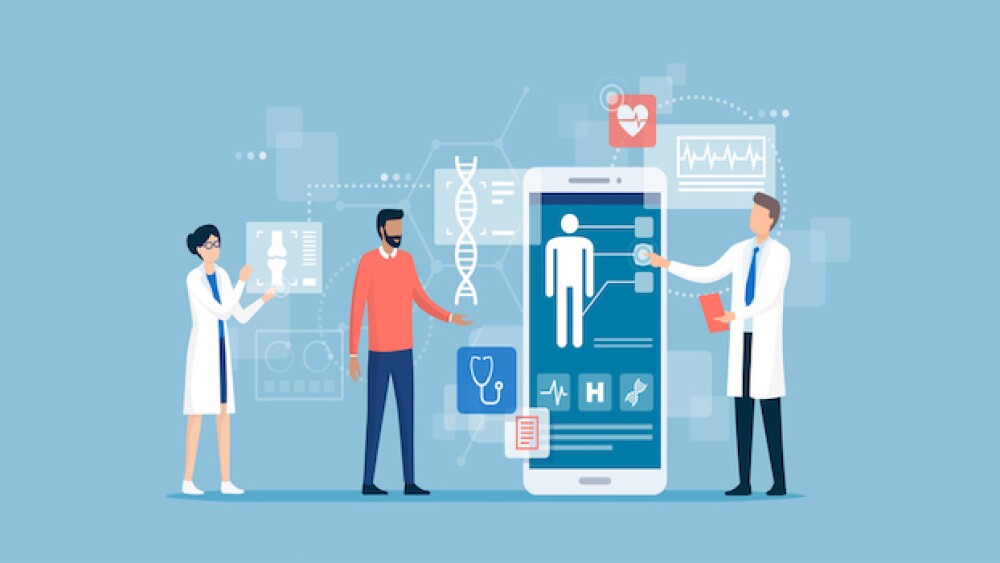On Sunday, ahead of the J.P. Morgan Healthcare Conference, Alphabet’s artificial intelligence startup Isomorphic Labs secured its first pharma partnerships with Eli Lilly and Novartis worth nearly $3 billion.
Pictured: Medical professionals use technology in healthcare/iStock,elenabs
2024 will continue to see Big Tech companies enter the artificial intelligence-based drug discovery space, potentially disrupting the biopharma industry. That was the consensus of panelists at a Tuesday session on AI and machine learning held by the Biotech Showcase, co-located with the 42nd J.P. Morgan Healthcare Conference.
The JPM conference got a reminder of Big Tech’s inroads into AI-based drug discovery with Sunday’s announcement that Google parent Alphabet’s digital biotech company Isomorphic Labs signed two large deals worth nearly $3 billion with Eli Lilly and Novartis.
“Big Tech is coming for AI and it’s coming in a big way,” said panel moderator Beth Rogozinski, CEO of Oncoustics, who noted that the AI boom has seen the rise of the “Magnificent 7,” a new grouping of mega-cap tech stocks comprised of the seven largest U.S.-listed companies—tech giants Amazon, Apple, Alphabet, Microsoft, Meta Platforms, Nvidia and Tesla.
Last year, the Magnificent 7’s combined market value surged almost 75% to a whopping $12 trillion, demonstrating their collective financial power.
“Six of the seven have AI and healthcare initiatives,” Rogozinski told the panel. “They’re all coming for this industry.”
However, Atomwise CEO Abraham Heifets made the case that with Big Tech getting into biopharma there is a “mismatch of business models,” with the Isomorphic Labs deals looking, in his words, “like traditional tech mentality.” Heifets contends that “it’s unclear whether the physics of the business will support the risk models” in the industry, adding that the influence of small- to mid-size companies focused on AI-based drug discovery should not be underestimated.
Google DeepMind’s AlphaFold is the foundation of Isomorphic Lab’s platform. The problem, according to ArrePath CTO Kurt Thorn, is that it’s easy for these technologies to “have fast followings” only to see their market shares wane over time. “If you look at AlphaFold, which was a breakthrough when it came out, within two or three years afterwards there were two or three alternatives.”
Thorn concluded that “it’s not clear that the market sizes are large enough to amortize a large AI platform for drug discovery across an entire industry.”
Rogozinski emphasized that these switching costs are a potential “barrier to entry” in moving to such drug discovery platforms as Big Tech tries to get companies to transition.
Vivodyne CEO Andrei Georgescu commented that drug discovery and development is a difficult and complex process that “is not a function of how big your team is or how many people you have behind the bench.” The key to the success of AI in biopharma “is in the generation and curation of datasets,” according to Georgescu, who said the industry is “facing a bottleneck on the complexity of the data and the applicability of the data to the outcomes that we want to confirm.”
Providing some levity and perspective to Tuesday’s AI session, Moonwalk Biosciences CEO Alex Aravanis told the audience he was late to arrive as a panelist due to an accident on the freeway involving a Tesla self-driving vehicle. “So, clearly, they need more data,” Aravanis said.
Marc Cikes, managing director of the Debiopharm Innovation Fund, told BioSpace that while he has been heartened to see the rise of AI and machine learning usage in biopharma, the forecast remains murky in 2024.
“The impact of AI for drug discovery is still largely unknown,” Cikes said. “The public market valuation of the few AI-drug discovery companies is significantly down versus their peak price, and a large chunk of the high-value deals announced between native AI companies and large pharmas are essentially based on future milestone payments which may never materialize.”
Greg Slabodkin is the News Editor at BioSpace. You can reach him at greg.slabodkin@biospace.com. Follow him on LinkedIn.






